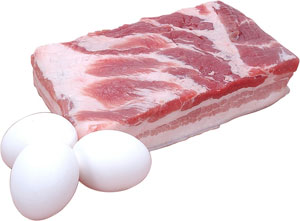I’ve lived through 40 years of fad diets ranging from Adele Davis, living foods, Paul Bragg, juice diets, macrobiotic, low fat, low carbohydrate, Mediterranean, high protein, to the currently fashionable Paleolithic diet. We may be coming around full circle with the recent findings that a high-fat breakfast consisting of foods rich in saturated fats such as bacon is actually good for you. Such are the findings of researchers at the University of Alabama at Birmingham led by senior study author, Martin E. Young, published in the March 30, 2010 issue of the International Journal of Obesity.
The study found that a high-fat (that’s fat, not protein!), low-carb breakfast jump starts your metabolism so that you have more energy throughout the day and you will process food more efficiently and lose belly fat, insulin resistance, lower blood lipids and prevent coronary heart disease, as well as prevent and reverse type 2 diabetes.
The study consisted of feeding mice either a high-fat (45% fat) breakfast or a high-carbohydrate breakfast with only 10% fat. All mice were given the same number of calories. The mice only had two meals a day; those with a high-fat breakfast had a high-carbohydrate dinner, and those with a high-carbohydrate breakfast had a high-fat dinner.
The mice with the high-fat breakfast had the best metabolic markers which include body weight, glucose tolerance and blood lipids, especially triglycerides, compared with the mice who ate high-fat dinners.
The study concluded that a high-fat meal at the beginning of the day could generate enough energy to drive up metabolism for the entire day, while a high-fat dinner would slow it down, resulting in weight gain. Chief researcher Martin E. Young, Ph.D, said that ‘The first meal seemed to ‘program’ their metabolism very effectively for the rest of the day.’
Good fats such as the omega-3 fatty acids abundant in salmon are recommended in the study, but it is my observation and experience that even saturated fat from bacon and sausage is the basis for energy storage. As described in Know Your Fats by Mary G. Enig, each pound of fat supplies us with approximately 4000 kilo-calories of reserve energy. Enig describes how this means that a slender person who weighs 150 pounds will be carrying 25 to 30 pounds of fat as energy reserves; the same amount of energy in carbohydrate form would have to weigh 50 to 70 pounds!
The Optimal Diet
Some years back, I was introduced to the work of Chicago Dr. Jan Kwasniewski described on his website as The Optimal Diet. He literally has treated and cured thousands of patients with a wide variety of chronic degenerative diseases ranging from obesity, coronary heart disease, arteriosclerosis, and diabetes, to arthritic conditions.
His dietary recommendation is especially radical to anyone like me, who has been persuaded of the value of low-fat diets. Dr. Kwasniewski recommends three to four times the amount of fat to protein along with one quarter or less the amount of carbohydrate. The Optimal Diet also strongly advocates the inclusion of organ meats (liver, heart, intestines, kidneys, etc) as superior to muscle meat such as filet mignon or New York cut steaks. Dr. Kwasniewski’s diet also completely downplays the importance of vegetables and fruits, which as carbohydrates occupy the smallest percentage in relation to fat and protein.
A typical Optimal Diet breakfast might consist of four slices of bacon, two or three eggs fried in the bacon fat, and a half slice of whole wheat toast with butter. Astonishingly, I’ve seen individuals whose cholesterol was 265 drop down to 187 after being only two weeks on this high-fat diet. Many of these also lost as much as two or three inches around the waist at the same time.
So I know it works at least for some, but the problem is that most of us are so heavily conditioned to believe that fat is bad for us and find it very difficult to follow such a strict high-fat diet. Now with the recent University of Alabama study, one can achieve good results by making sure your highest fat meal happens at breakfast. If you prefer, you can use a wide variety of fats including so-called ‘good fats:’ omega 3 fatty acids as found in flax seeds, salmon and sardines.
So my eldest son just called to invite me to his house for a breakfast this morning of delicious pancakes with fruit topping and a couple slices of bacon on the side. I wonder how I should respond!

